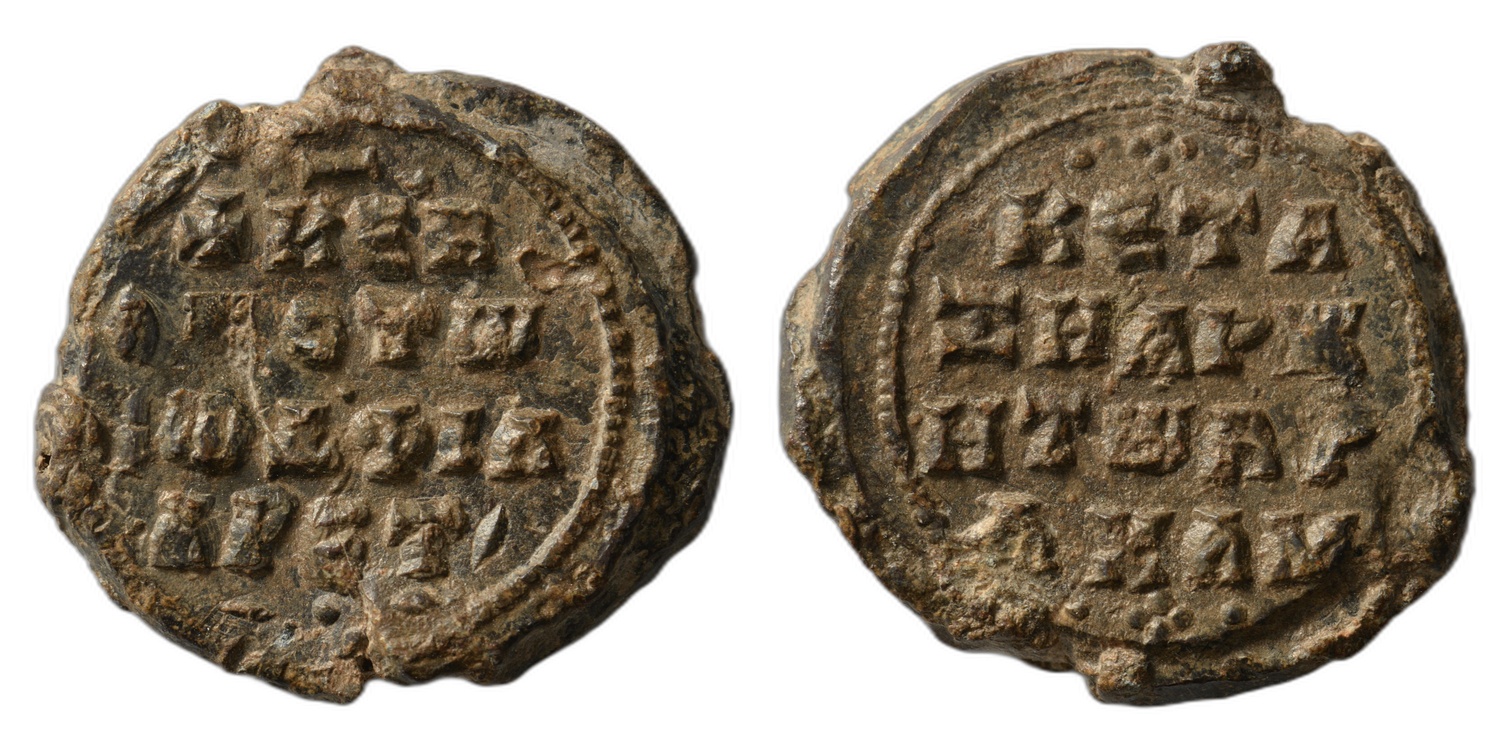Philaretos Brachamios, taxiarches, mid 11th century
Identifier
ANRO-1707
Seal Description
Ranks & Titles: taxiarches
Specifications: Diameter 27mm
Obv. Description: Inscription of four lines, followed by decoration. Border of dots.
Obv. Inscription: Κ(ύρι)ε βοήθ(ει) τῷ σῷ δ(ούλῳ) Φιλαρέτ(ῳ)
Inscr. Translation: Lord, help your servant Philaretos
Rev. Description: Inscription of four lines, preceded and followed by decoration. Border of dots.
Rev. Inscription: Κύριε βοήθει τῷ σῷ δούλῳ Φιλαρέτῳ [. . .] κε ταξηάρχῃ τῷ Βραχαμίῳ
Inscr. Translation: and taxiarches Brachamios
Specifications: Diameter 27mm
Obv. Description: Inscription of four lines, followed by decoration. Border of dots.
Obv. Inscription: Κ(ύρι)ε βοήθ(ει) τῷ σῷ δ(ούλῳ) Φιλαρέτ(ῳ)
Inscr. Translation: Lord, help your servant Philaretos
Rev. Description: Inscription of four lines, preceded and followed by decoration. Border of dots.
Rev. Inscription: Κύριε βοήθει τῷ σῷ δούλῳ Φιλαρέτῳ [. . .] κε ταξηάρχῃ τῷ Βραχαμίῳ
Inscr. Translation: and taxiarches Brachamios
Seal Obverse Text
+Κεr
οηθτ
σδ,Φιλ
αρετ
Seal Reverse Text
κετα
ηαρχ
ητrρ
αχαμ
Publications or references
Cheynet, “Les Brachamioi,” under no. 13 (dates to 1050–60)
Provenance
Dumbarton Oaks, Accession Number: BZS.1958.106.5670
Notes
Philaretos Brachamios was a notable Byzantine military figure of Armenian descent who played a significant role during the mid-11th century. His early career is marked by his service as taxiarches, a rank indicating his command over an infantry regiment. This position highlights his early involvement in the Byzantine military hierarchy and sets the stage for his later prominence.
Philaretos rose to greater prominence following the Battle of Manzikert in 1071, eventually controlling significant territories in Cilicia, Armenia, and Syria as a semi-autonomous ruler. This seal reflects the beginning stages of his military career, prior to his elevation to higher ranks such as kouropalates and domestikos.
The seal's inscription reveals the invocation of divine assistance, a common feature in Byzantine seals, emphasizing Philaretos's reliance on spiritual protection and favor. The obverse and reverse inscriptions are framed with decorative elements, typical of Byzantine seal design.
The reference to "κε" on the reverse suggests that the engraver may have omitted a preceding title, potentially indicating Philaretos's progression within the military ranks.
Philaretos rose to greater prominence following the Battle of Manzikert in 1071, eventually controlling significant territories in Cilicia, Armenia, and Syria as a semi-autonomous ruler. This seal reflects the beginning stages of his military career, prior to his elevation to higher ranks such as kouropalates and domestikos.
The seal's inscription reveals the invocation of divine assistance, a common feature in Byzantine seals, emphasizing Philaretos's reliance on spiritual protection and favor. The obverse and reverse inscriptions are framed with decorative elements, typical of Byzantine seal design.
The reference to "κε" on the reverse suggests that the engraver may have omitted a preceding title, potentially indicating Philaretos's progression within the military ranks.
See All Items in Category
Citation
“Philaretos Brachamios, taxiarches, mid 11th century,” Armenian Numismatic Research Organization, accessed April 24, 2025, https://armnumres.org/index.php/items/show/1707.


